Lt. Watada hearing tackles free speech for soldiers, relevancy of truth
Lt. Ehren Watada sat before military judge Lieutenant Colonel John Head for a pre-trial hearing yesterday that will go a long way to defining what will, and will not, be allowed by the defense during the full court martial when it begins on February 5.
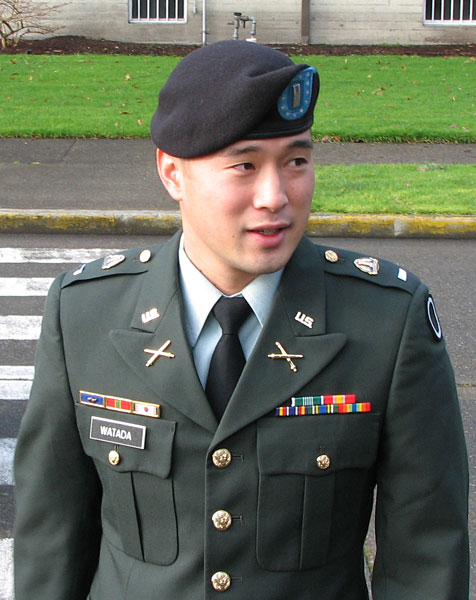
1-watada.jpg
Watada hearing tackles free speech for soldiers, relevancy of truth
Jeff Paterson, Courage to Resist. January 5, 2007
FORT LEWIS, WA – More than a hundred people rallied yesterday morning at the gates of Fort Lewis, Washington in support of Army First Lieutenant Ehren Watada, the first officer to publicly refuse to fight in Iraq.
About a mile away, Lt. Watada sat before military judge Lieutenant Colonel John Head for a pre-trial hearing that will go a long way to defining what will, and will not, be allowed by the defense during the full court martial when it begins on February 5.
Lt. Watada faces two years in a military prison for “missing movement” as result from his refusal to board a plane to Iraq with the First Stryker Brigade last June. Additionally, he faces four additional years, one year per count of “conduct unbecoming an officer and gentleman,” resulting from statements he made to the press.
Journalists and anti-war activists subpoenaed for Army prosecution
During the proceedings, lead prosecutor Captain Daniel Kuecker repeatedly defended his subpoenas of civilian reporters Sarah Olson and Gregg Kakesako, and Seattle-area anti-war activists Phan Nguyen and Gerri Haynes, as “relevant” and “admissible” for the prosecution.
Lt. Col. Head dismissed the subpoenas for reporters and activists to appear at yesterday’s pre-trial hearing less than two days prior. Although Lt. Col. Head expressed some skepticism regarding this possible subpoenaed testimony, these reporters and activists remain under order to take the stand on February 5. They are being ordered to help send Lt. Watada to prison for his public explanations as to why he did not deploy to Iraq – or face six months in prison and a $500 fine for contempt of a military court.
In a lengthy feature in today’s San Francisco Chronicle, independent journalist Sarah Olson declared, "Journalists should not be asked to participate in the prosecution of political speech. Dragging a journalist into court like this really damages the barrier between press and government. When speech is the crime, the journalist really can be the investigative arm, the eyes and ears of the government." She has received public support from the national association of Military Reporters and Editors, along with the PEN-USA. See www.FreePressWG.org for more information.
Where does the First Amendment end for military servicepersons?
The morning session of yesterday’s hearing turned on the vague question of what exactly are the limits of free speech for members of the military. Military case law regarding outspoken anti-war Vietnam-era GI’s was addressed, along with that of white racists in the military.
Lt. Watada’s civilian defense attorney Eric Seitz of Honolulu, Hawaii opened by declaring that, “First, there is nothing wrong with the statements Lt. Watada made. There is simply no offense. Second, attempting to prosecute these types of statements raise significant constitutional problems. Finally, this is a selective prosecution of speech in retaliation for Lt. Watada not deploying to Iraq.”
Judge Lt. Col. Head challenged all parties to answer what test he should apply to political speech. This led Capt. Kuecker, the military prosecutor, to grudgingly acknowledge that the First Amendment does indeed apply to members of the military. Seitz added that even “forceful” political speech is allowed, as long as it’s not “contemptuous.”
Kuecker acknowledged that the government is actually charging Lt. Watada with “contempt of government officials” under the nebulas “conduct unbecoming of an officer and gentleman” article of the Uniform Code of Military Justice.
“Lt. Watada’s speech was offensive to the military,” and as such was illegal, claimed Kuecker. Head rhetorically asked if all statements “offensive to the military” are punishable by court martial?”
Larry Mosqueda, a local supporter of Lt. Watada who viewed the proceedings from a spectator overflow room near the courtroom remarked, “The prosecutions case is extraordinarily weak, and incompetently presented.”
For authentication, the Army noted that a crime lab has analyzed the video recording of Lt. Watada presenting a speech to hundreds of military veterans at the Veterans for Peace National Convention held last August in Seattle.
Is the legality of the Iraq War an irrelevant political question?
At the core of Lt. Watada public refusal to deploy to Iraq is his understanding that the Iraq occupation war is not only morally wrong, but illegal based on both international and U.S. law. To that end, defense attorney Eric Seitz promised to “present overwhelming evidence that the war is illegal, beyond any doubt.” Kuecker later retorted, “We don’t believe EVERY legal scholar will find the war illegal.”
The prosecution, and likely the judge as well, would like to see the legality of the war as purely a political question. If so, “This court is not authorized to hear that. It’s a non-judicial question,” asserted Kuecker.
“But hasn’t the prosecution made these questions relevant by the way you have charged this case? Aren’t you trying to block these issues for coming in the front door, but opening up the back door?” asked Judge Head. “You have charged motive as an offense.”
Seitz asserted that “The legality of the Iraq War is not merely a political question. Lt. Watada’s specific intent was to avoid unlawful actions in Iraq… For the sake of due process, we need the opportunity to raise this issue.”
“Conduct charges might help Watada's defense” read yesterday’s headline of The Olympian newspaper in summing up the prosecutions significant contradictions and problems.
During a break in the pre-trial hearing, Lt. Watada briefly greeted reporters out side the military courtroom. Later that evening at a nearby press conference for Lt. Watada’s family and attorneys, Lt. Watada again chose to not make any public statements.
Seitz explained that Lt. Watada was literally facing additional years of imprisonment for simply speaking. During the hearing, Seitz pointed out that when Lt. Watada takes the stand in his own defense and explains his objections to the war, these statements alone could well be the basis for additional charges of conduct unbecoming and officer and gentleman.
At the end of the day, Lt. Watada’s father Robert offered “My son is resolute, and I’m so proud of him. While I was on Fort Lewis another Lieutenant came up to me and said, “It’s such a load of crap what they are trying to do to your son.””
Support Lt. Watada – Refuse Illegal War
Supporters are asked to write Lt. General James Dubik, Commanding General Fort Lewis, 1 Corps Building 2025 Stop 1, Fort Lewis WA 98433. Please request that General Dubik “Dismiss all charges and honor Lt. Watada's long-standing resignation from the U.S. Army.”
A Citizens' Hearings is being convened January 20-22 at Evergreen State College, Tacoma campus in order to fully evaluate Lt. Watada’s claims regarding the legality and morality of the Iraq War. Confirmed witness include: Daniel Ellsberg, military analyst who released the Pentagon Papers in the Vietnam War; Denis Halliday, former UN Assistant Secretary General; Richard Falk, Professor Emeritus of International Law at Princeton University. For more information: www.WarTribunal.org
Finally, help spread the word about the regional mobilization at Fort Lewis on day Lt. Watada’s court martial is scheduled to begin on February 5, or organize your own local protest in solidarity on that day. For more information: www.ThankYouLt.org or www.CourageToResist.org

2-family.jpg
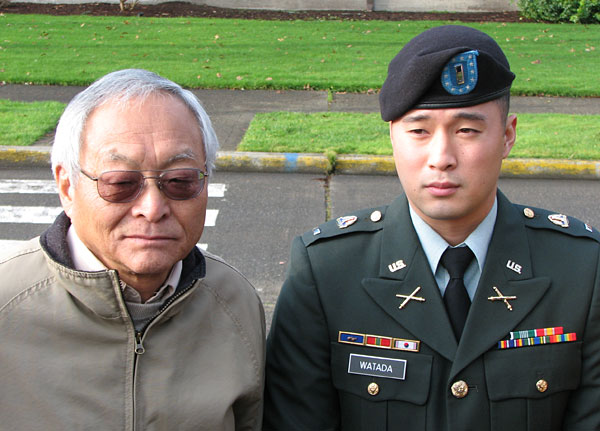
3-father-son.jpg
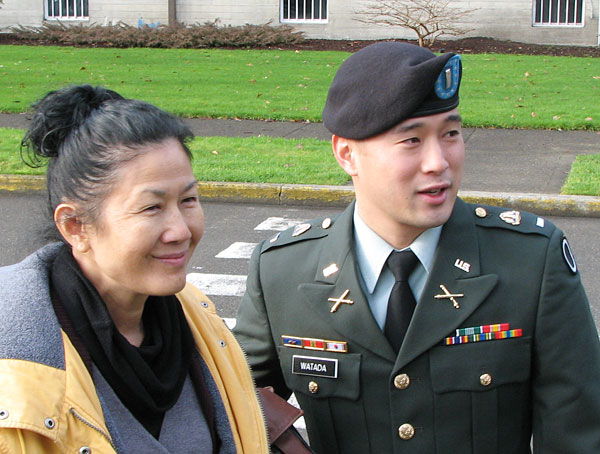
4-ho-watada.jpg
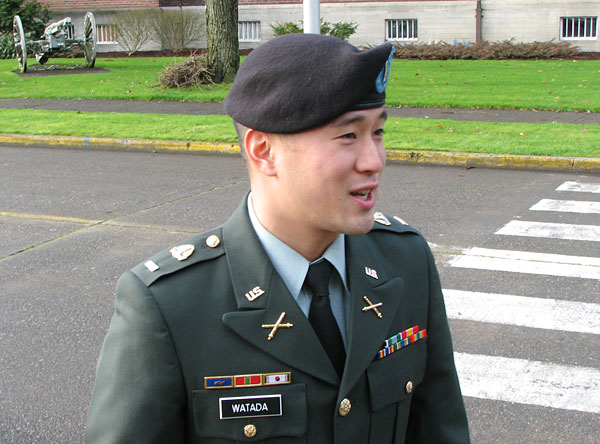
5-watada-cannon.jpg
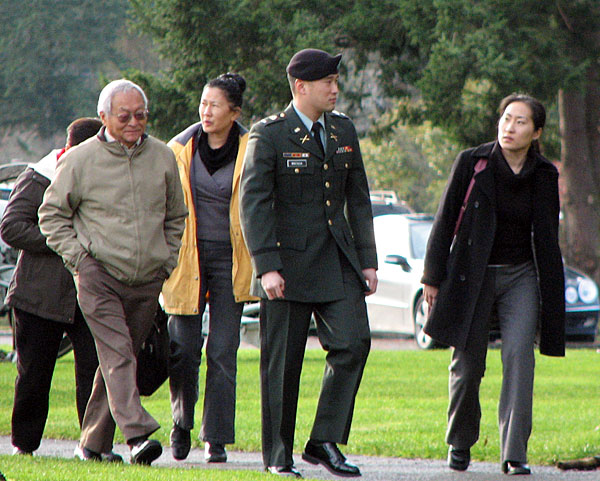
6-watada-walking.jpg
No comments:
Post a Comment